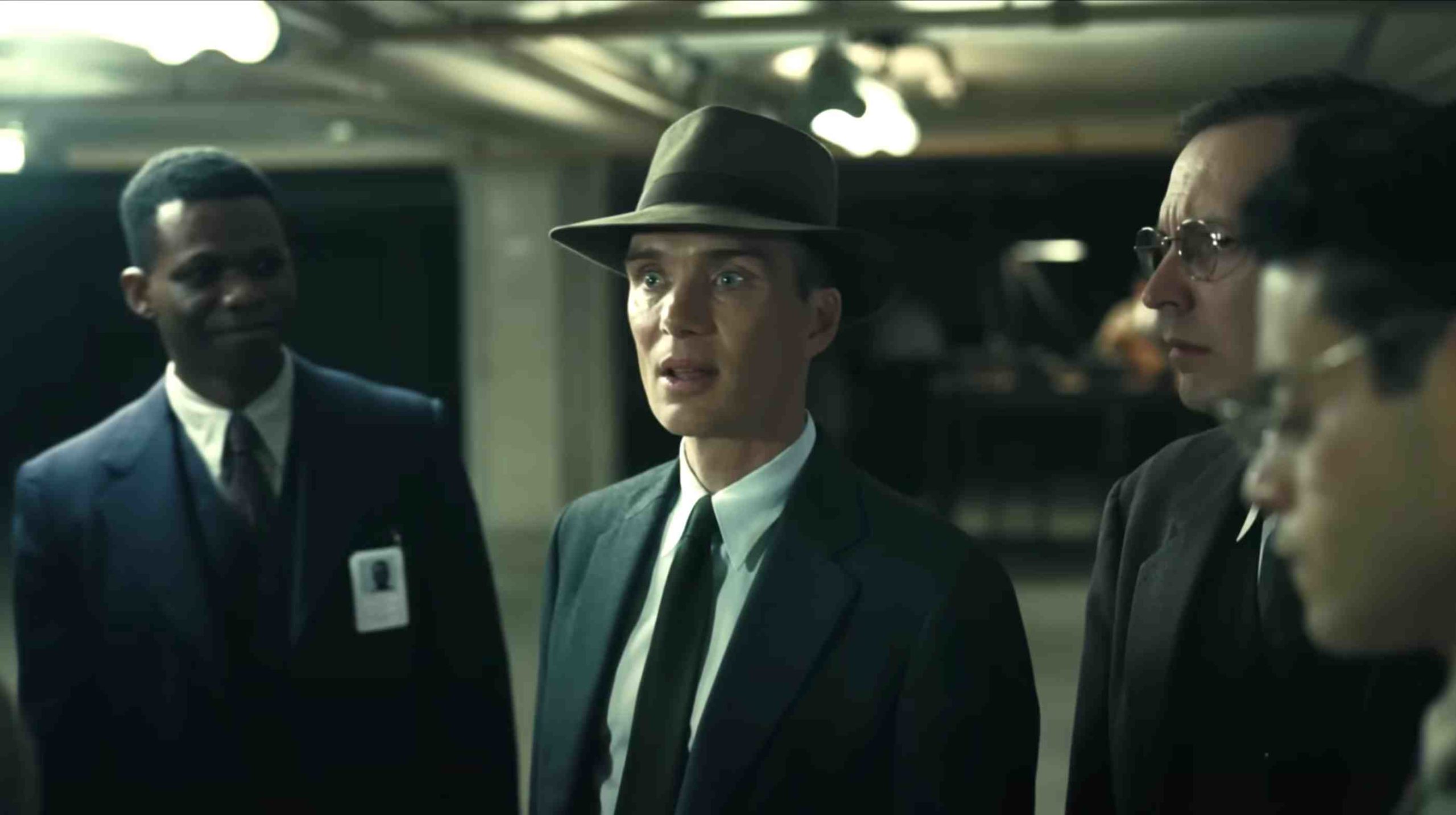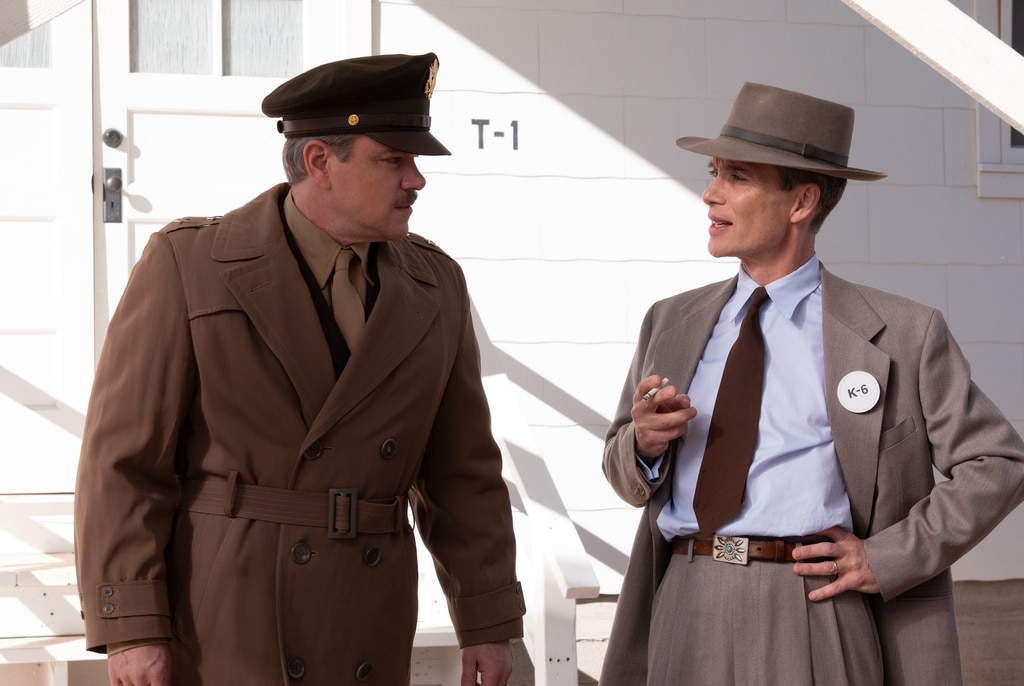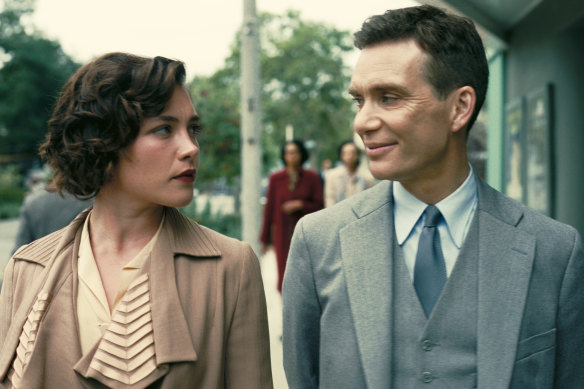Movie Review – Oppenheimer
Principal Cast : Cillian Murphy, Emily Blunt, Matt Damon, Robert Downey Jr, Florence Pugh, Josh Hartnett, Casey Affleck, Rami Malek, Kenneth Branagh, Benny Safdie, Jason Clarke, Dylan Arnold, Tom Conti, James D’Arcy, David Dastmalchian, Dane DeHaan, Alden Ehrenreich, Tony Goldwyn, Jefferson Hall, David Krumholtz, Matthew Modine, Gustaf Skarsgard, Michael Angarano, Jack Quaid, Josh Peck, Olivia Thirlby, Christopher Denham, David Rysdahl, Louise Lombard, Alex Wolff, Emma Dumont, Scott Grimes, Gary Oldman, Davon Bostick, Pat Skipper, James Remar, Matthias Schweighofer, James Urbaniak.
Synopsis: The story of American scientist, J. Robert Oppenheimer, and his role in the development of the atomic bomb.
********
There’s a line in Spielberg’s Jurassic Park that hangs like the sword of Damocles over everything in Christopher Nolan’s wartime drama-thriller Oppenheimer; the noted chaotician Ian Malcolm, when referring to the creation of dinosaurs thanks to scientific breakthroughs, (and I’m paraphrasing here) reminds us all that science “…is too preoccupied with whether they could, to stop and question whether they should..” The thought-bubble experiment and real-world catastrophe unleashed upon the Japanese mainland by J Robert Oppenheimer’s creation – a creation borne of billions of dollars and innumerable scientific minds working in a single direction for years – is the subject of this very question in the deepest, most reflective sense, in which the creator of the atomic bomb is wracked by guilt at what he has accomplished despite the great victory it brought, and the US Government’s eventual dissociation with the theoretical physicist. Oppenheimer ponders the great question indeed: was the creation of atomic annihilation to end the second world war worth the suffering and misery and terror inflicted upon humanity since?

One part tense bomb building thriller, another part bureaucratic kangaroo courtroom drama, Nolan’s Oppenheimer is a carefully constructed examination of the hero status afforded both Robert Oppenheimer and the Manhattan Project’s scientific community immediately upon the revelation of their involvement in the destruction of Hiroshima and Nagasaki, and their fall from grace at having brought so much destruction into the world. The film features two plotlines twisting into each other – the central one is told from Oppenheimer’s (Cillian Murphy) point of view and follows the scientist’s life from his early days schlepping through Europe learning from distinguished professors, through to the Manhattan project, the Trinity Test, and a quite lengthy discussion on whether or not the man was loyal to America, at the height of McCarthyism and the Red Scare. The second plotline is seen from the perspective of businessman and eventual Atomic Energy Commission advisory Lewis Strauss (Robert Downey Jr) as he seeks to become US Secretary of Commerce in the late 1950’s, whereupon he also assumes to engage in a political battle with Oppeheimer over governmental security clearance.

Nolan weaves the various bubbling dramatic throughlines with precision, his screenplay adapted from material found in the 2005 book “American Prometheus”, written by Kai Bird and Martin Sherman, and he crafts a film that balances the more lurid subjects of Oppenheimer’s life – that he had multiple affairs while married, and that he also had links to the American Communist Party and various other associations – with the more pragmatic mechanical aspects of, you know, inventing the atomic bomb. Oppenheimer’s relationship with wife Kitty (a terrific Emily Blunt), his mistress Jean Tatlock (Florence Pugh, grossly underutilised) and another woman (Louise Lombard), is perhaps the clunkiest aspect of the movie, with Nolan seemingly unsure how to infuse his largely academic premise with emotion and struggling to really nail Oppenheimer’s humanity. When the film focuses on “the science” and the development of Los Alamos, the base for the Trinity Test and highly secretive Manhattan Project, Oppenheimer positively crackles with narrative energy, and even the more “talky” scenes have a real engagement factor that makes the bulging three-hour runtime feel quite well paced. In perhaps the film’s most surprising creative choice, the Trinity Test isn’t the climax of the film as one might expect. but rather almost a mid-point in the film’s narrative as we then delve into Oppenheimer’s guilt and Strauss’ attempts to subvert the man’s legacy, which becomes almost a mini-film in and of itself. I noted to a friend that Oppenheimer almost feels similar to Amadeus in many ways, although primarily because both films tell a story of a flawed, genius of a man who single-handedly changed the world, who was brought low by the jealousness of another. Oppenheimer was undoubtedly the Mozart of the physics world, while Strauss is easily the embittered Salieri.

Coupled with the one-two punch of Cillian Murphy and Robert Downey Jr, both of whom ought to receive plenty of industry award buzz for their work here, Oppenheimer is absolutely stacked with name talent from top to bottom, virtually a who’s who of notable Hollywood actors – the film is primarily a sausage-fest, no matter how many times Nolan cuts to Pugh’s nubile form in the film’s not-really-needed sex scenes – and for most of the movie I felt like I was pointing at the screen and screaming “oh it’s that guy” every five minutes. An older Josh Hartnett, a near-unrecognizable David Krumholtz, Oscar-winners Matt Damon, Rami Malek, Kenneth Branagh and Gary Oldman, Oscar nominee Casey Affleck, and icons like Matthew Modine, Tony Goldwyn, James Remar, Tom Conti (terrific as Albert einstein) spread throughout the film in a variety of cameo and supporting turns, while comparative newcomers like Solo’s Alden Ehrenreich, The Suicide Squad’s David Dastmalchian, Chronicle’s Dane DeHaan, Army Of Thieves star Matthias Schweighofer, and The Orville’s Scott Grimes fill out this impressive catalogue of stars. Nobody – I repeat nobody – puts a foot wrong performance wise, although I wasn’t as impressed with director/actor Benny Safdie’s take on Hungarian-born physicist Edward Teller (the father of the H-bomb) as I expected to be. It’s perhaps easier to pinpoint who isn’t in Oppenheimer, if I’m honest.

Oppenheimer is a film that I was impressed by, but struggled to quote-unquote enjoy. That’s not to say it’s a great film, because it’s both a remarkable technical achievement – the replication of the Trinity Test without setting off an actual nuclear weapon, or doing it all as CG, is astonishing in today’s CG-riddled age – and a compelling dramatic narrative of the life of a man many have heard about but few would be familiar with, and while the movie has been described as everything from propagandist claptrap to a maudlin case study in survivor’s guilt, Nolan and the behind-the-camera team in production have crafted something of remarkable beauty. The fact that the film contains virtually no computer effects whatsoever, meaning Oppenheimer is as analogue as the creation of the bomb itself. It’s impossibly dense, so a working knowledge of American atomic science history is probably advised (or just history generally), and the group I attended the cinema to see the film noted a couple of actual real-life events depicted that only students of this material would be aware of, so prepare yourself. As with many Nolan films, however, there’s a coolness to the emotional heartbeat of the film I struggled to get past, and despite the solid work of Emily Blunt in the depressive yet strong-willed homemaker wife role, not even her attempts to galvanise empathy seemed to work. Oppenheimer is a proficient and well made movie, and I recognise it as a genuinely astounding period film, but was I entertained by it? Somewhat, but not as much as I was impressed with the work that went on to make it.

“Every man, woman and child lives under a nuclear sword of Damocles, hanging by the slenderest of threads, capable of being cut at any moment by accident or miscalculation or by madness.” – President John F Kennedy, September 25th, 1961 – UN General Assembly Speech
I think time will be kind to Oppenheimer’s legacy, thankfully, despite my reticence with it as a piece of entertainment. We have so very few auteur directors with such vision as Christopher Nolan that even a big-budget mainstream arthouse project such as this should be (and has been) embraced by the punditry and casual fan alike, and we need to actively support prestige projects such as this be made more often. Cillian Murphy makes an appropriately sombre and moving portrayal of the title character, Robert Downey Jr plays a heck of a venal antagonist, and the attention to period detail is superb, to say nothing of Ludwig Goransson’s thunderous score and Hoyte van Hoytema’s crisp, aching cinematography, with both these elements combining to provide the film with bombastic energy apropos of its subject matter. Oppenheimer is a remarkable film and no doubt one of the best of the year (it’s my strongest tip for Best Picture to-date) but I found myself at odds with its impressiveness contrasted to my enjoyment of it.


